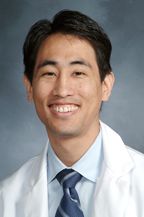A million dollars in Movember money funds advanced prostate cancer research
Prostate cancer experts at Weill Cornell Medicine are part of a team that received a $1 million award to investigate a new treatment for an advanced form of the disease.
Scott Tagawa, M.D., will lead the Weill Cornell cohort. The multi-institutional team also includes Joshua Lang, M.D. (University of Wisconsin), Howard Scher, M.D. (Memorial Sloan Kettering Cancer Center), Scott Dehm, Ph.D. (Masonic Cancer Center, University of Minnesota), and Kimberly Ku, M.D. (University of Wisconsin).
There are currently no curative treatments for men with advanced prostate cancer. Patients currently try a series of different treatments that may prolong life and reduce symptoms, but will inevitably fail. New therapeutic strategies for advanced prostate cancer are desperately needed.
Tagawa and the team will use the money to study whether targeting TROP-2 - a novel protein that is expressed on many forms of advanced prostate cancer - will be an effective treatment strategy. They will validate TROP-2 as a therapeutic target in various clinical states of prostate cancer by evaluating TROP-2 expression in patient samples. Tumor samples will also be comprehensively evaluated for mutations and genes expressed in order to identify molecular pathways associated with TROP-2 expression and various clinical disease states.
They will also see whether circulating tumor cells (CTCs) -- tumor cells that can be found in the blood of patients, and represent a non-invasive alternative to tumor biopsies for evaluating tumor biology -- can be used to identify patients who may be candidates for TROP-2-targeted therapy.
A phase I clinical trial has been initiated to test IMMU-132, a TROP-2-specific antibody conjugated to a chemotherapeutic drug, in patients with metastatic castrate-resistant prostate cancer (mCRPC). A phase II trial is also planned to open in late 2017. CTCs and tumor biopsies will be periodically collected from patients on these trials and evaluated for mutations and expression of genes including TROP-2, to identify biomarkers of response and resistance to IMMU-132.
If successful, the project will validate whether targeting TROP-2 with IMMU-132 is promising in patients and identify biomarkers that can be used to select patients who will benefit from this treatment.
The project was one of six to receive Challenge Awards from the Prostate Cancer Foundation (PCF) and the Movember Foundation. PCF received a donation of $5.4 million from the Movember Foundation, the leading global men’s health charity helping men live happier, healthier, and longer lives, to help fund the 2017 Challenge Awards. Of these funds, more than $4.7 million came from the 2016 Movember U.S. Campaign with $687,000 coming from the 2016 Distinguished Gentleman’s Ride. Since 2007, the Movember Foundation has contributed more than $50 million to PCF to further new discoveries in prostate cancer research.
“The generous donation from the Movember Foundation enables teams of research scientists to accelerate the delivery of life-extending and life-saving therapies for men living with prostate cancer,” said Jonathan W. Simons, M.D., president and chief executive officer, PCF. “As we embark upon the 10th year of our remarkable relationship with the Movember Foundation, we are grateful to continue our partnership as we continue to help further advance therapies and defeat prostate cancer once and for all.”
Paul Villanti, Director of Programs, the Movember Foundation said: "The Movember Foundation has been working in proud partnership with PCF for 10 years now, and these Challenge awards represent a key part of our global plan to reduce death and suffering from prostate cancer. Work of this quality is only made possible through the incredible efforts of our fundraising community, and we’re delighted that the Mo Bros and Mo Sistas have this year been joined by the Distinguished Gentleman’s Ride in driving the progress so sorely needed for men in the US, and around the world”



